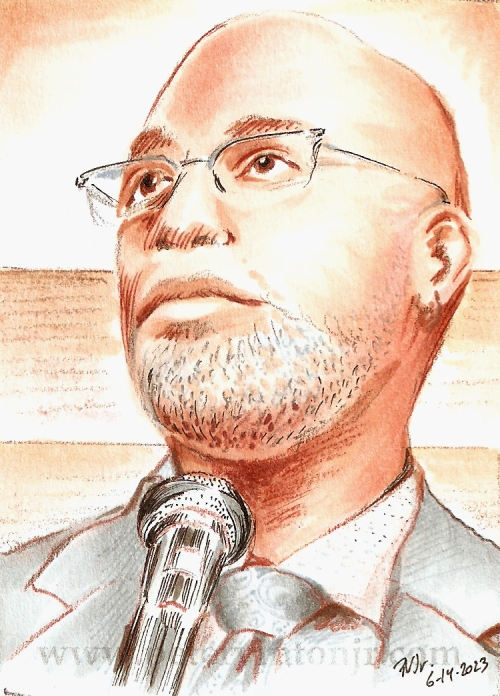
An ongoing illustrative history study
This piece originally posted 6/14/2023
Prelude | 124 | 125 | 126 | 127 | 128 | 129 | 130 | 131 | 132 | Email |
|---|
"In 1989 Chris died in my arms. I had neither the time nor the desire to process my grief. Things were so catastrophic that I felt like if I let myself understand the depth of what was going on, I would never, ever come out of it. For me, the solution was to work."
Meet community organizer, activist, and educator Phill Wilson. Born in 1956 Chicago to parents who had been part of the Great Migration, Phill credits his supportive parents for not only encouraging an early commitment to local civil rights (among them an involvement in Operation PUSH), but also being supportive of his decision to come out as a gay man in 1980.
After the death of his partner Chris Brownlie by an HIV related illness in 1989, Wilson founded the Black AIDS Institute --motivated not only by his partner's passing but also by his own HIV diagnosis. In a time when AIDS was still widely regarded as a "gays-only" disease, Wilson did not think there was enough emphasis on solving the HIV/AIDS epidemic in the Black community, especially since HIV/AIDS was proveably disproportionately affecting the Black community.
From 1990 to 1995 Wilson was the Director of Public Policy for AIDS Project Los Angeles (now APLA Health), the second largest provider of AIDS services in the nation; a role he took on "because I was interested in contributing to the lives of gay and lesbian people in general, and to the lives of black gays and lesbians specifically. And even more specifically to black gay men impacted by HIV and AIDS."
Wilson also served as a World AIDS Summit delegate and advocated for the Center for Disease Control and Prevention to provide additional funding to Black groups so they would have the resources to educate and mobilize their community around HIV/AIDS issues. His work resulted in the "Act Against AIDS" campaign, now known as the "Let's Stop HIV Together" campaign, which promotes HIV testing, prevention and treatment:
"I've lived with HIV for most of my life. I never expected to make it to thirty, much less sixty! I am of a generation that lost scores of friends and loved ones through this disease, and I was given a death sentence on more than one occasion. Eventually I came to understand that the only way to save my life and the lives of those I love was to fight. To fight the disease, to fight all the 'isms,' to fight the stigma, to fight an uncaring government, to fight an ignorant public, to fight an inadequate health care system, and to fight my own fears of inadequacy."
Next page - Lesson 129: Miss Major Griffin-Gracy